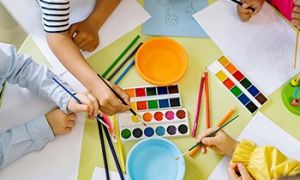From the 2nd of April to the 13th of April is Nature Play Week. Nature Play Week is an annual event that celebrates the importance of outdoor play and connecting children with nature. The following provides activity ideas that will help you celebrate Nature Play Week at your service and can be implemented into the curriculum for children.
About Nature Play Week
Nature Play Week was developed by the Kids in Nature Network and is part of broader efforts like Premier’s Active April, which encourages daily physical activity. The event has grown over the years, receiving accolades for its impact on communities and its role in promoting sustainability and well-being.
It encourages families, educators, and communities to create opportunities for children to explore, imagine, and learn in natural environments. The initiative highlights the physical, emotional, and social benefits of spending time outdoors, fostering a deeper connection with the natural world.
Activities
-
Nature Scavenger Hunt: Create a list of natural items for children to find, such as leaves, rocks, or flowers.
-
Mud Kitchen Play: Set up a mud kitchen where children can mix, pour, and create with natural materials.
-
Leaf Art: Use leaves to create prints, collages, or even crowns.
-
Bug Observation: Provide magnifying glasses for children to observe insects and learn about their habitats.
-
Building with Sticks and Stones: Encourage children to construct small structures using sticks, stones, and other natural materials.
-
Nature Journaling: Let children draw or write about their outdoor experiences in a journal.
-
Outdoor Storytime: Read nature-themed books in an outdoor setting.
-
Planting Seeds: Teach children about gardening by planting seeds and watching them grow.
-
Stick Painting: Gather sticks and paint them to create colorful decorations.
-
Nature Mandalas: Create patterns or mandalas using natural objects like pebbles, leaves, and flowers.
-
Bird Watching: Provide binoculars (real or toy) for children to observe birds and learn their names.
-
Nature Bracelet Craft: Wrap tape (sticky side out) around children's wrists and let them attach small flowers, leaves, or seeds to create bracelets.
-
Tree Hugging Adventure: Encourage children to explore tree textures by touching, measuring, and even hugging them.
-
Sensory Walk: Guide children through nature trails to experience different textures like grass, sand, and bark.
-
Rain Play: On rainy days, allow children to splash in puddles and explore the sensation of wet grass.
-
Nature Storytelling: Sit outdoors and co-create a story inspired by the environment around them.
-
Rock Balancing Challenge: Encourage children to create sculptures by stacking rocks and experiment with balance.
-
Cloud Gazing: Lay down on the grass and let children identify shapes and patterns in the clouds.
-
Sensory Nature Bottles: Fill clear bottles with natural items like sand, shells, or water and glitter for sensory exploration.
-
Shadow Play: Use natural light to create shadow figures and trace them on paper or the ground.
-
Tree Bark Rubbing: Provide paper and crayons for children to make textured rubbings of tree bark.
-
Outdoor Obstacle Course: Use logs, branches, and stones to create a fun physical challenge.
-
Water Play with Natural Materials: Set up a play area with sticks, leaves, and water for children to experiment with floating and sinking.
-
Nature Dance Party: Play music and let children dance outdoors, using leaves and flowers as props.
-
Birdhouse Craft: Build and decorate birdhouses to attract local wildlife.
-
Natural Alphabet Hunt: Find items in nature that resemble the shapes of letters.
Further Reading
Benefits Of Outdoor Area
How Does Nature Affect A Child's Development
Outdoor Play With Babies
Nature Programs In Early Childhood Settings
Designing Engaging Outdoor Learning Spaces
Learning With Nature
Incorporating Natural Materials In The Learning Environment
Sustainability Activities For Toddlers and Preschoolers
Insect Theme Activities For Toddlers and Preschoolers







 Open ended questions cannot be responded to with one word answers such as yes or no. These types of questions enables a child to provide
Open ended questions cannot be responded to with one word answers such as yes or no. These types of questions enables a child to provide During your child’s preschool years, an important milestone begins to emerge. This is the development of pre-writing skills. Pre-writing skills are used to encourage, develop
During your child’s preschool years, an important milestone begins to emerge. This is the development of pre-writing skills. Pre-writing skills are used to encourage, develop Open ended materials enables children to play freely. They are objects that have no rules to follow, use or function. Raw materials that can be
Open ended materials enables children to play freely. They are objects that have no rules to follow, use or function. Raw materials that can be An Acknowledgment of the Country is a way of showing respect for the Traditional Owners and can be given by both non-Indigenous people and Aboriginal
An Acknowledgment of the Country is a way of showing respect for the Traditional Owners and can be given by both non-Indigenous people and Aboriginal Language plays an important role in a child’s development. It enables a child to communicate effectively with their family, learn at school, socialize with friends,
Language plays an important role in a child’s development. It enables a child to communicate effectively with their family, learn at school, socialize with friends, Like adults, children have to deal with their own stress in life. Moving house, starting a new school, preparing for a new sibling - these are
Like adults, children have to deal with their own stress in life. Moving house, starting a new school, preparing for a new sibling - these are Playdough is such a versatile material. It provides numerous benefits to children as they manipulate it, it is safe and soothing and provides children with
Playdough is such a versatile material. It provides numerous benefits to children as they manipulate it, it is safe and soothing and provides children with Teaching children about sustainability enables them to appreciate and respect the natural environment. Early childhood services can provide meaningful hand on learning experiences in order
Teaching children about sustainability enables them to appreciate and respect the natural environment. Early childhood services can provide meaningful hand on learning experiences in order Recycling is an important concept that teaches children to care for the environment. It encourages children to be responsible and show a growing appreciating for
Recycling is an important concept that teaches children to care for the environment. It encourages children to be responsible and show a growing appreciating for When children apply paint to paper, glue things together, or pound a lump of clay, they experiment with colour, shape design and texture.
When children apply paint to paper, glue things together, or pound a lump of clay, they experiment with colour, shape design and texture.



